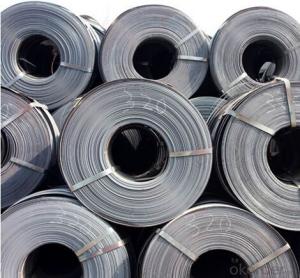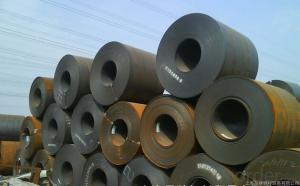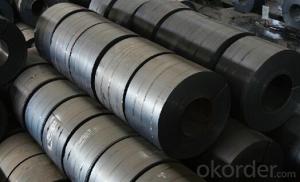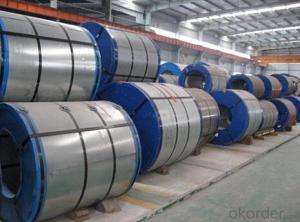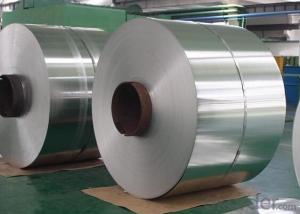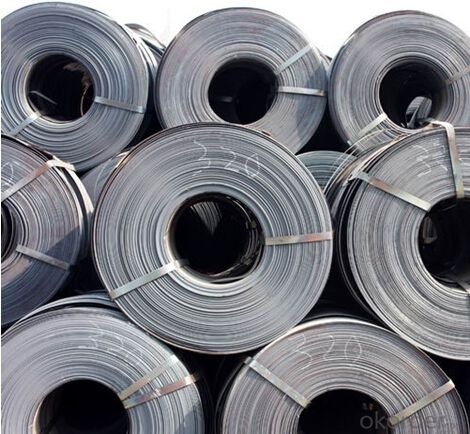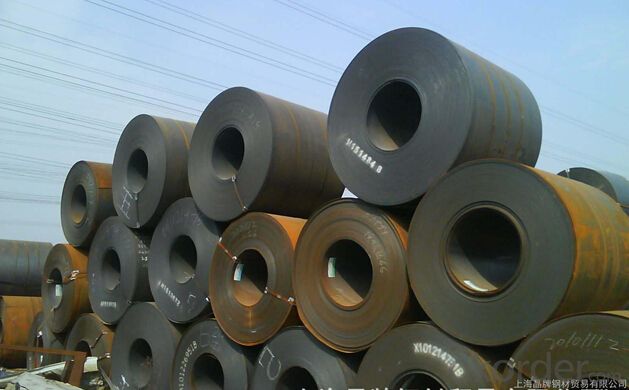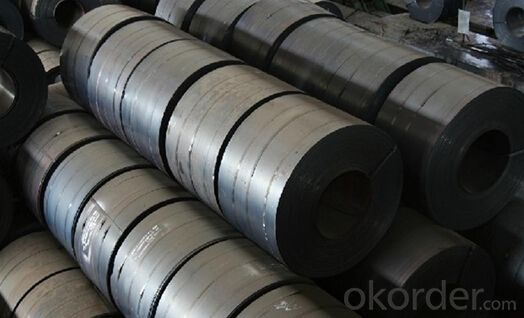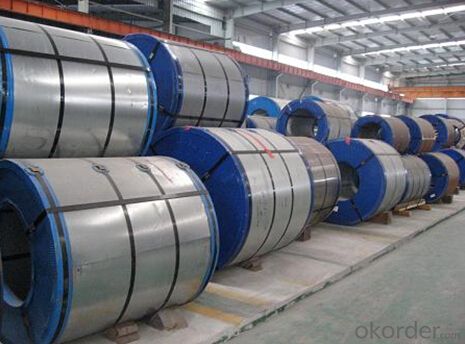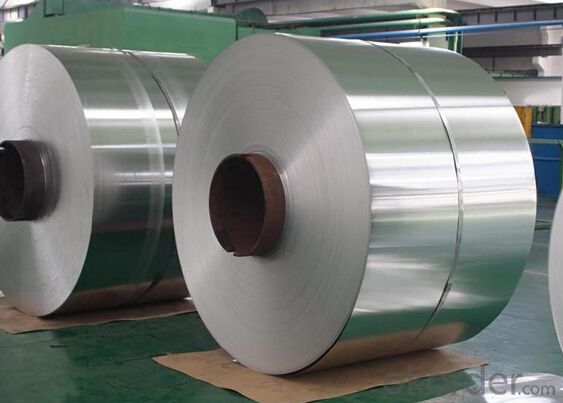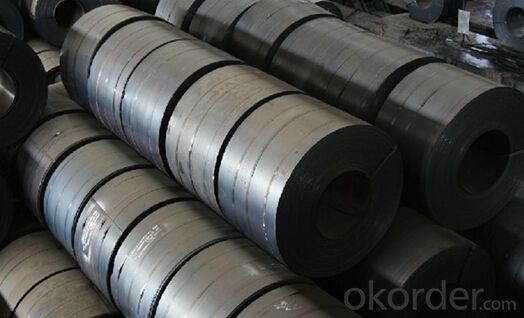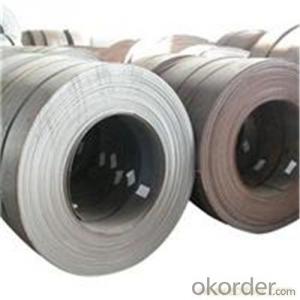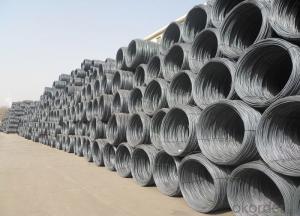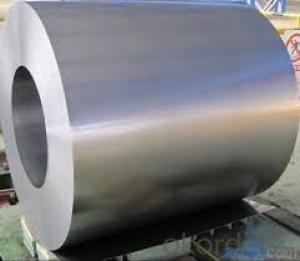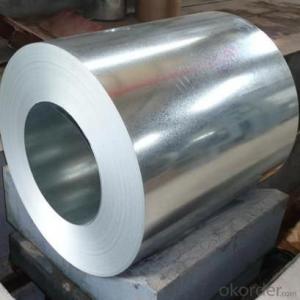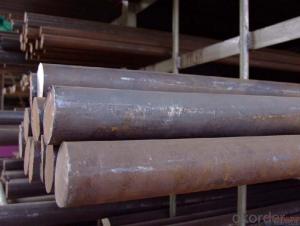S50C HR High Carbon Steel Coil_ Plate_Strip with Low Price
- Loading Port:
- Tianjin
- Payment Terms:
- TT OR LC
- Min Order Qty:
- 25 m.t.
- Supply Capability:
- 10000 m.t./month
OKorder Service Pledge
OKorder Financial Service
You Might Also Like
Specification
S50C HR High Carbon Steel Coil_ Plate_Strip with Low Price
Quick Details
Name | Hot Rolled Steel Coil |
Standard | GB/ASTM/SAE/AISI/DIN/JIS/EN/BS |
Surface Treatment: | Black/Peeling/Polished/Machined |
Delivery Condition: | Hot Rolled or Forged/Peeled or Black Surface |
Test | SGS/UT 100% Elements Testing |
Certificate: | ISO/Mill Certificate |
Service: | 24 hours online service / |
more than 20 years trading and manufacture | |
Quality Assurance: | the third party inspection, such as SGS, BV, TUV…etc. is acceptable |
Packaging Details: | Seaworthy Packaging or as per customer's packing instruction |
Specification
Commodity | Hot rolled steel plate/Mild steel plate/black steel plate/Carbon steel plate/sheet |
STEEL GRADE | A36, AH36,A283 Gr.C, SS400, S235J1/S235J2/S235JR, S275J1/S275J2/S275JR, A516 Gr.60/A516 Gr.70, ST37-2 |
Standard | GB,JIS,DIN,AISI,ASTM |
Thickness | 1.5mm ~ 200mm |
Width | 1000mm 1220mm 1250mm 1500mm 2000mm 2500mm 3000mm |
length | below 12000mm & coil |
Surface | Clean, blasting and painting according to customer requirement |
Delivery time | standard size 15days goods can load into container, if produce goods need 35days |
Application | Widely used in petrochemistry,chemistry,electricity,boiler and vessel manufacture,and could |
be made into reactor,heat exchange facility,segregator,sphere vessel,oil tank,liquid gas storage | |
tank,nuclear reactor press shell,turbine and other machines | |
Shipping | length below 5.8m with 20' container, length below 11.8m with 40' container. or Bulk shipping. |
Company Information
CNBM International Corporation is the most import and export platform of CNBM group(China National Building Material Group Corporation) ,which is a state-owned enterprise, ranked in 270th of Fortune Global 500 in 2015.
With its advantages, CNBM International are mainly concentrate on Cement, Glass, Iron and Steel, Ceramics industries and devotes herself for supplying high quality series of refractories as well as technical consultancies and logistics solution.
After-sale service | l CNBM provides the services and support you need for every step of our cooperation. We’re the business partners you can trust; you can relax and get on with doing business. |
l For any problem, please kindly contact us at any your convenient time, we’ll reply you in our first priority within 24 hours | |
Advantages | Industry experience over 20 years. |
Shipment of goods -More than 70 countries worldwide. | |
The most convenient transport and prompt delivery. | |
Competitive price with best service. | |
High technical production line with top quality products. | |
High reputation based on best quality products. |
Product Show
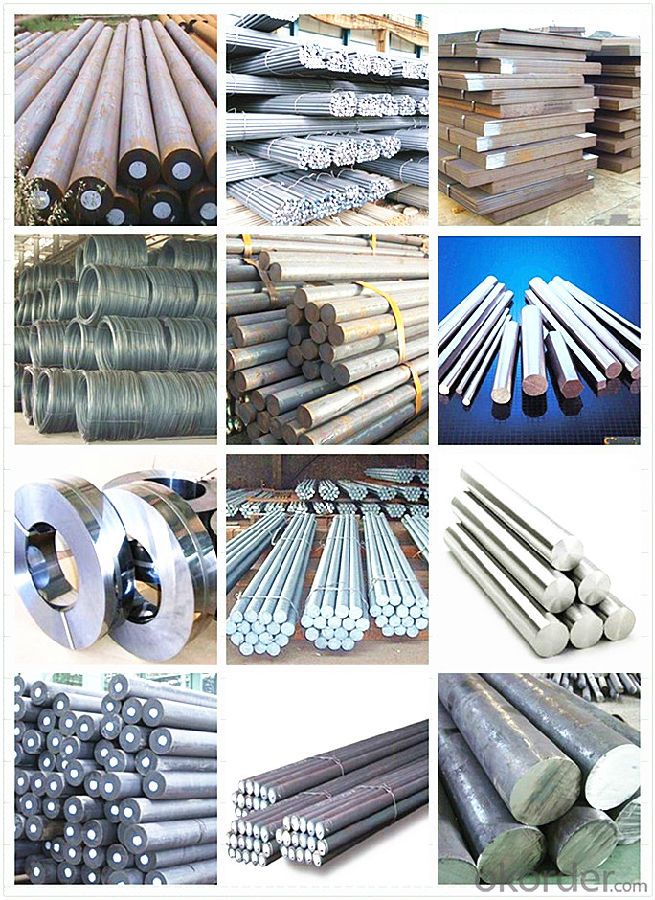
FAQ
Are you a trading company or manufacturer? | Manufacturer |
What’s the MOQ? | 3 metric ton |
What’s your delivery time? | 15-35 days after downpayment received |
Do you Accept OEM service? | Yes |
what’s your delivery terms? | FOB/CFR/CIF |
What's the Payment Terms? | 30% as deposit,70% before shipment by T/T |
Western Union acceptable for small amount. | |
L/C acceptable for large amount. | |
Scrow ,Paybal,Alipay are also ok | |
Why choose us? | Chose happens because of quality, then price, We can give you both. |
Additionally, we can also offer professional products inquiry, products knowledge train (for agents), smooth goods delivery, excellent customer solution proposals. | |
What's your available port of Shipment? | Main Port, China |
What’s your featured services? | Our service formula: good quality+ good price+ good service=customer's trust |
Where are your Market? | Covering more than 160 countries in the world |
- Q: What are the different methods of surface finishing for special steel?
- Some different methods of surface finishing for special steel include electroplating, powder coating, hot-dip galvanizing, and passivation.
- Q: Can special steel be used in the production of springs?
- Yes, special steel can be used in the production of springs. Special steel, such as alloy steel or stainless steel, is often preferred for its high strength, durability, and resistance to corrosion, making it suitable for applications where springs need to withstand heavy loads or harsh environments.
- Q: How does special steel contribute to the industrial machinery aftermarket industry?
- Special steel plays a crucial role in the industrial machinery aftermarket industry by providing high-quality and durable components that enhance the performance and longevity of machinery. One of the main contributions of special steel to this industry is its exceptional strength and resistance to wear and tear. Industrial machinery is subjected to heavy loads, extreme temperatures, and corrosive environments, which can cause regular steel components to deteriorate quickly. However, special steel alloys are specifically designed to withstand these harsh conditions, ensuring that the machinery operates efficiently for an extended period. Moreover, special steel offers excellent machinability, making it easier to manufacture intricate and precise components. This enables aftermarket manufacturers to produce replacement parts that perfectly fit into existing machinery, minimizing downtime during repairs and maintenance. Additionally, special steel's machinability allows for customization, as it can be easily shaped and modified to meet the specific requirements of different machinery models. Furthermore, special steel's exceptional heat resistance makes it ideal for the production of high-temperature components used in industrial machinery. These components, such as turbine blades or furnace parts, need to withstand intense heat without losing their structural integrity. Special steel alloys possess excellent heat resistance properties, ensuring that the machinery can operate at high temperatures without compromising performance or safety. Additionally, special steel contributes to the industrial machinery aftermarket industry by providing corrosion-resistant components. Many industries, such as oil and gas or marine, expose machinery to corrosive substances or environments. Regular steel components are susceptible to corrosion, leading to premature failure and costly repairs. However, special steel alloys are highly resistant to corrosion, enhancing the durability and reliability of machinery in these demanding conditions. Overall, special steel's unique properties, including strength, machinability, heat resistance, and corrosion resistance, significantly contribute to the industrial machinery aftermarket industry. By utilizing special steel components, manufacturers can enhance the performance, durability, and longevity of machinery, reducing downtime, and improving overall operational efficiency.
- Q: Is special steel suitable for manufacturing molds and dies?
- The manufacture of molds and dies greatly benefits from the use of special steel. This type of steel encompasses a range of high-quality varieties that possess outstanding properties, including high hardness, wear resistance, toughness, and exceptional heat resistance. These qualities make special steel an ideal choice for producing molds and dies. Molds and dies play a critical role in various industries, such as automotive, aerospace, electronics, and manufacturing. They are responsible for shaping, forming, and cutting materials into desired shapes and sizes. Given the repetitive and demanding nature of their applications, molds and dies are subjected to high pressures, temperatures, and abrasive forces. Consequently, they require a material that can endure these conditions while maintaining their dimensional stability and performance. Special steel, specifically tool steel, is engineered to meet these requirements. It boasts a high level of hardness, allowing it to resist wear and deformation, even under extreme circumstances. This characteristic ensures that molds and dies made from special steel can maintain their shape and precision for extended periods, resulting in improved product quality and reduced maintenance and replacement downtime. Furthermore, special steel provides excellent heat resistance, which is crucial for molds and dies used in high-temperature applications like plastic injection molding or forging. It can withstand the thermal cycling and rapid heating and cooling associated with these processes without compromising its mechanical properties or developing cracks or deformation. Additionally, special steel is renowned for its exceptional toughness, which is vital for molds and dies subject to high pressures and impacts. It has the ability to absorb and distribute applied forces, preventing premature failure and prolonging the lifespan of molds and dies. To summarize, special steel is highly suitable for manufacturing molds and dies due to its remarkable properties, including high hardness, wear resistance, toughness, and excellent heat resistance. These exceptional qualities enable molds and dies to withstand the demanding conditions of their applications, resulting in enhanced performance, longevity, and cost-effectiveness for manufacturers.
- Q: What are the requirements for special steel used in food processing equipment?
- The requirements for special steel used in food processing equipment are crucial for ensuring the safety and hygiene of the food being processed. Here are some key requirements: 1. Corrosion resistance: Special steel used in food processing equipment must have excellent resistance to corrosion. It should be able to withstand exposure to various food products, cleaning agents, and environmental conditions without deteriorating or contaminating the food. 2. Hygienic properties: The steel must have a smooth surface finish and be free from any cracks, pits, or crevices where bacteria or food particles can accumulate. This helps in easy cleaning and prevents the growth of harmful microorganisms, ensuring the food's safety. 3. Non-reactivity: Food processing equipment's steel should not react with the food or alter its taste, color, or odor. It must be chemically inert and should not release any substances that could contaminate or affect the food's quality. 4. High temperature resistance: Food processing often involves high-temperature operations like cooking, sterilization, or pasteurization. Special steel used in such equipment must be able to withstand these temperature extremes without losing its structural integrity or releasing any harmful substances. 5. Mechanical strength: The steel should possess sufficient mechanical strength to withstand the processing equipment's operational stresses, such as pressure, vibration, or impact. This ensures its durability and prevents any failures or breakages during operation. 6. Compliance with regulations: Special steel used in food processing equipment must meet specific regulatory standards and certifications related to food safety and hygiene, such as the FDA (Food and Drug Administration) or NSF (National Sanitation Foundation) guidelines. Compliance with these regulations ensures that the equipment is safe for use in the food industry. Overall, the requirements for special steel used in food processing equipment revolve around ensuring the equipment's durability, cleanliness, and safety while maintaining the quality and integrity of the processed food.
- Q: How does special steel contribute to the construction of bridges?
- The utilization of special steel is of utmost importance in the construction of bridges as it provides enhanced strength, durability, and resilience, thereby guaranteeing the structural integrity and safety of these vital infrastructure projects. One of the main advantages of special steel in bridge construction lies in its high tensile strength, allowing it to endure heavy loads and extreme weather conditions. This strength is particularly crucial in large-span bridges, where the steel must bear significant weight and withstand forces like wind, earthquakes, and traffic vibrations. Additionally, special steel offers exceptional corrosion resistance, which is essential for bridges exposed to harsh environments, such as those in close proximity to coastal areas where saltwater can be highly corrosive. By preventing or minimizing corrosion, the lifespan of the bridge is significantly prolonged, resulting in reduced maintenance and repair costs. Furthermore, special steel can be fabricated to precise specifications, allowing for the creation of intricate bridge designs and innovative structural solutions. This flexibility enables engineers to design bridges that are not only functional but also visually appealing. In conclusion, special steel is a vital element in bridge construction due to its strength, durability, corrosion resistance, and adaptability. Its utilization ensures the longevity, safety, and efficiency of bridges, ultimately benefiting the communities they serve.
- Q: Can special steel be used in the rubber manufacturing industry?
- Yes, special steel can be used in the rubber manufacturing industry. It is commonly used for making molds, dies, and other components that are used in the production process of rubber products. Special steel provides durability, strength, and resistance to wear, which are essential properties required in the rubber manufacturing industry.
- Q: How is high-speed tool steel used in the production of machining tools?
- High-speed tool steel is used in the production of machining tools due to its exceptional heat resistance, hardness, and wear resistance. It allows for the efficient machining of materials at high speeds, reducing production time and enhancing productivity. This steel is commonly utilized in the manufacturing of cutting tools, such as drills, milling cutters, and taps, to ensure precision and durability in machining operations.
- Q: What are some common applications of special steel?
- Special steel, also known as alloy steel or tool steel, is a type of steel that has been specifically designed to exhibit enhanced properties compared to traditional carbon steel. Due to its unique composition, special steel finds a wide range of applications in various industries. One common application of special steel is in the manufacturing of cutting tools. Tools such as drills, saws, and milling cutters require high hardness, wear resistance, and toughness to withstand the demanding conditions of cutting and machining operations. Special steel provides these qualities, enabling the tools to maintain their sharpness and cutting efficiency for longer periods. Additionally, special steel is extensively used in the automotive industry. It is employed in the production of engine components, such as crankshafts, camshafts, and connecting rods, which require high strength, fatigue resistance, and heat resistance. Special steel's superior mechanical properties make it ideal for these critical engine parts, ensuring durability and performance. Another application of special steel is in the construction of molds and dies. Special steel is often used to fabricate injection molds, extrusion dies, and forging dies due to its exceptional thermal conductivity, wear resistance, and toughness. These properties allow for efficient and precise shaping of materials in the manufacturing of various products such as plastic components, metal parts, and automotive body panels. Special steel also finds applications in the aerospace industry. It is utilized in the production of aircraft components, including landing gears, turbine blades, and structural parts. The high strength, heat resistance, and corrosion resistance of special steel make it suitable for withstanding the extreme conditions experienced in aviation, ensuring the safety and reliability of aircraft. Furthermore, special steel is employed in the energy sector. It is used in the manufacturing of turbine blades for power generation, where high temperature and pressure conditions require materials with excellent creep resistance and thermal stability. Special steel's ability to withstand these harsh environments makes it an essential material in the construction of power plants. In summary, special steel is widely used in various industries for its exceptional properties. Its applications range from cutting tools and automotive components to molds and dies, aerospace parts, and power generation equipment. The versatility of special steel allows for the production of high-quality, durable, and efficient products across different sectors.
- Q: What are the different surface hardening grades of special steel?
- There are several surface hardening grades of special steel, including case-hardening steels such as 1018, 8620, and 8620H, which are commonly used for applications requiring a hard outer layer and a tough core. Another grade is nitriding steel, such as 4140, 4340, and 410, which are specifically designed for nitriding processes to improve wear resistance. Additionally, tool steels like D2, A2, and O1 are often used for surface hardening applications due to their high hardness and wear resistance properties. Overall, the choice of surface hardening grade depends on the specific requirements of the application.
Send your message to us
S50C HR High Carbon Steel Coil_ Plate_Strip with Low Price
- Loading Port:
- Tianjin
- Payment Terms:
- TT OR LC
- Min Order Qty:
- 25 m.t.
- Supply Capability:
- 10000 m.t./month
OKorder Service Pledge
OKorder Financial Service
Similar products
Hot products
Hot Searches
Related keywords
